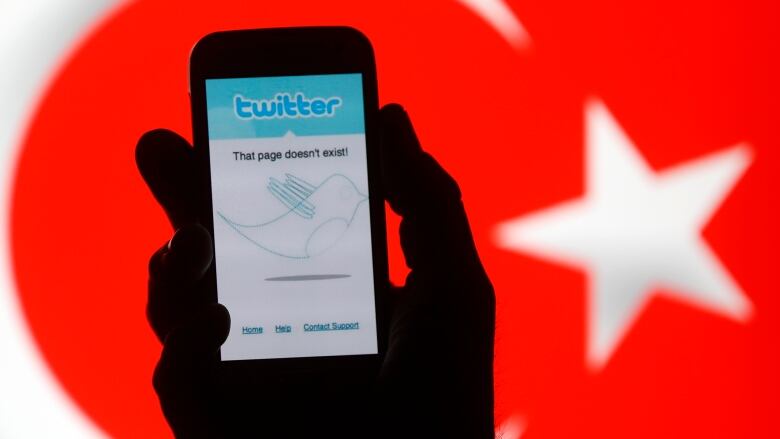Turkey's bid to make Twitter block reporter part of growing digital censorship trend, advocates say
Social media sites remove content at the behest of governments all the time

Two years after Turkey deportedjournalist Mahir Zeynalov for "posting tweets against high-level state officials,"the country's increasingly paranoid government wants Twitter to silence the outspokenreporter for good.
The government has issued a court order demandingZeynalov's Twitter page and a handful of othersbe blocked from view within Turkey for"promoting terrorism, violence, and threatening national security and public order."
Zeynalov's account remains activewhileTwitter decides what to do about the request.
Twitter andother social media platforms have complied with government censorship demands before even when they weren't legally obligated to. This has digital rights advocates crying foul over what they say is an increasinglycommon tactic for quellingdissent.
Twitter told me that it will block my account at the request of Turkey for "instigating terrorism," putting an end to my ~7-year reporting.
—@MahirZeynalovTurkey's crackdown
Forced to leave Turkey in2014,Zeynalov now lives inWashington, D.C.,where he usesTwitter to inform his 132,000-plus followers about theTurkish government'scrackdown on dissidents in the wake of this summer's failed coup.
"I have been reporting the arrest of journalists, freedom of press violations, as well as the massive post-coup crackdown on tens of thousands of people,"Zeynalovtold CBC News."It is not surprising that the Turkish government wanted to restrict my access to some part of my audience."
Twitter notified Zeynalovof the court orderon Sept. 22 and said it may appeal if "there is an appropriate legal basis to do so."
ButZeynalov isn't hopeful. Many ofof his colleagues in Turkey have already been blocked, he says, adding Twitter has a track record of bowing to Turkey's demands.
Twitter did not respond to multiple requests for comment. But according to its own transparency report, the company received 2,493 court orders and other legal requests from Turkish authorities to remove content betweenJan. 1 and June 30, 2016 more than any other country.
Twitter complied in 23 per cent of those cases.
Any company that has declared itself to bethe free speech wing of the free speech partyshould really think twice about becoming repression's little helper.-EvaGalperin, Electronic Frontier Foundation
While social media companies are not above the law,digital activists say there's no reason they should bow to regimes like Turkey.
"Twitterdoes not have any offices in Turkey. It doesn't have any employees in Turkey. It's not legally required to follow these requests from the Turkish government,"Eva Galperin, global policy analyst for theElectronic Frontier Foundation, a digital rights advocacy group,told CBC News.
"I think any company that has declared itself to be the free speech wing of the free speech party should really think twice about becoming repression's little helper."
Twitter is complicit in Turkey's post-coup censorship, @MahirZeynalov's will be at least 13th verified journalisthttps://t.co/5Qy8nGZnyD https://t.co/eogkKh1VRC
—@efekeremAre some tweets better than none?
So why would a company that brands itself a free speech champion even consider playing nice with a government that's been locking up journalists and shutting down news outlets?
"What the Turkish government always threatens to do is block Twitter, altogether," Galperin said.
Turkey has blocked Twitter, Facebook and YouTubeat various points in the past.
But Galperin notes thatonly a handful of countries China and North Korea, for example have managed to block major social media services for anysignificant length of time, andpeople still tend tofind ways around it.
"I think Twitter should call their bluff," Galperinsaid. "I think they should do it early and often."
A global censorship trend
What's happening in Turkey is part of troublinga global trend, saysDrew Mitnick, policy counsel at Access Now, a global advocacy organization that defends digital rights.
ByTwitter's estimate, removal requests from government agencies increased worldwide by13 per cent between 2015 and 2016. Facebookreceived30,000 government requests for users' data or content restrictions in 2015, up 18 per cent from the previous year, according to its transparency report.
Many of these cases represent legitimate legal violations. Facebook cites gambling, obscenity and death threats among itsexamples of removedcontent.
But Mitnick worries that many governments are citing terrorist incitement to quell political speech like when Facebook suspended the accounts of seven Palestinian journalists earlier this week.
"We've seen these platforms which have commonly been the basis for dissent or political speech beingused to suppress that feature and to promote the government's platform exclusively," he told CBC News.
Solidarity and death threats
Zeynalov, meanwhile, is getting lots ofsupport.News of his potential blockinggarnered immediate and widespread backlash.
No ones been better at documenting Turkey's jailing of journalists than @MahirZeynalov. Shame on Twitter, if true. https://t.co/N5enpaNWqr
—@FreedomofPress.@twitter Please explain. Do you think journalism is terrorism? #JournalismIsNotACrime https://t.co/m83VRl0jzP
—@pressfreedomProminent Canadian columnist Paul Wells deactivated his own account in solidarity with Zeynalov.
Paul Wells just quit Twitter for a very good reason pic.twitter.com/Cdsn5MiZtO
—@DougSaunders"I am very grateful for the solidarity of my colleagues and others who believe that blocking my account means bowing to Ankara's pressure and a clear censorship," Zeynalov said.
In the meantime, hecontinues to tweet though he fears for his family back home in Turkey.
"At a time when Turkish media is suffocated and completely cowed into submission, the only channel critical journalists haveis Twitter," saysZeynalov. "And that also is under threat."












_(720p).jpg)


 OFFICIAL HD MUSIC VIDEO.jpg)
.jpg)



























































































